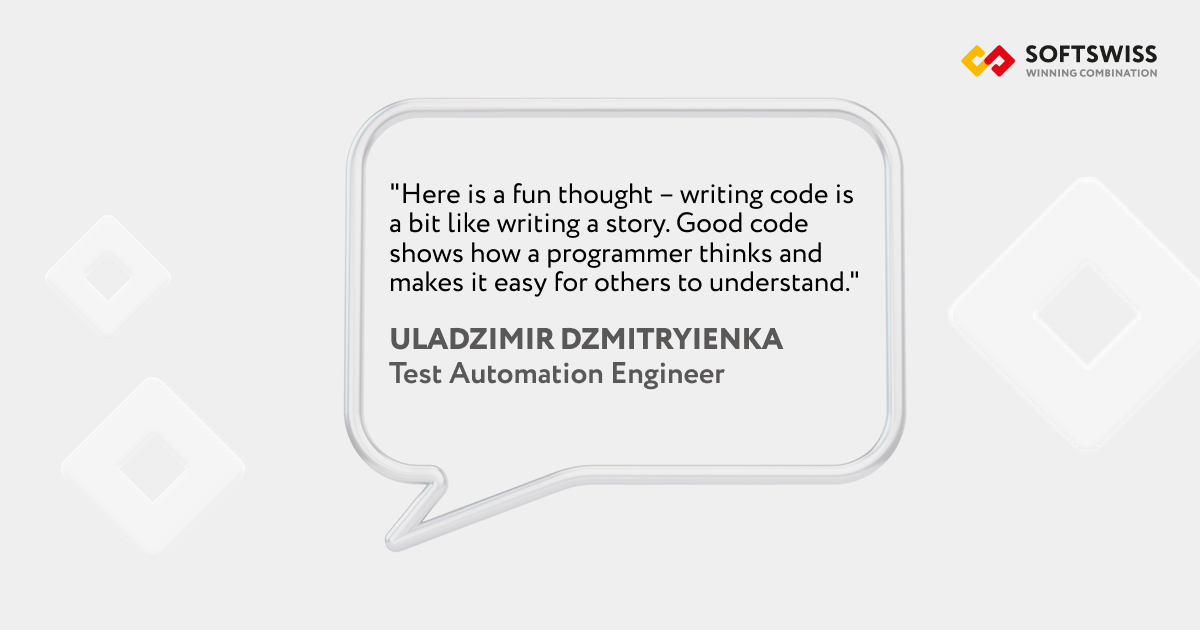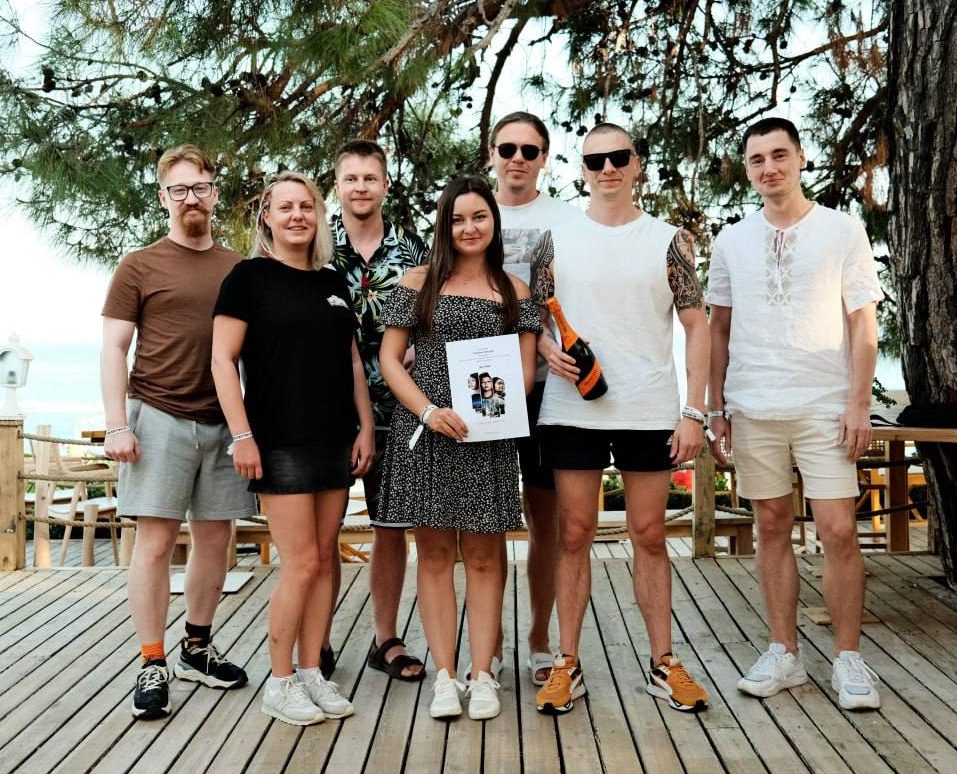Contemplating a shift to the IT field while holding a background in the humanities may spark a familiar resonance for many. Some might readily identify with the notion, thinking, “Yes, this resonates with me,” while others might raise an eyebrow, questioning the overly simplified division between techies and humanitarians. The prevailing stereotype that aspiring programmers and developers must excel in mathematics is deeply ingrained globally. However, this perspective does not have enough real-world proof, according to the findings of a 2020 study conducted by psychology professor Chantel Prat and her American colleagues. Their research challenges the common belief, asserting that a natural tendency for learning languages is more crucial for programming success. Coding, as it turns out, shares striking parallels with linguistics.
In November’s SOFTSWISS in Faces, we want to tell you the story about Uladzimir Dzmitryienka, Test Automation Engineer at SOFTSWISS. His journey from a background in liberal arts to a technical specialist serves as compelling evidence that defies stereotypes. It underscores a profound truth: with genuine determination, anyone can metamorphose into the professional they aspire to be. Join us as we delve into Uladzimir’s story, discovering how his passion for languages became the bridge that seamlessly connected his liberal arts roots to a thriving career in the dynamic realm of IT.
– Could you take us on a captivating journey from the humanities to the technical field? What prompted such a sharp and unexpected turn in your path?
– After dedicating over three intense and eventful years to the Faculty of Philology at BSU, I made a bold decision to pivot drastically and delve into manual software testing.
Putting my university studies on the back burner, I threw myself into the dynamic world of testing, technology, and IT business. With diligent effort, I not only acquired the essential theoretical foundation required for a junior tester but also honed practical skills. Two weeks before completing the course, I embarked on the job hunt, sending out my resume to countless opportunities. Despite a hundred applications, only two responses materialised, leading to a single interview.
Recalling that initial interview is a bit challenging – an hour and a half whizzed by in a blur, while the subsequent two weeks of anticipation felt interminable. However, the wait proved worthwhile as it culminated in a rewarding job offer.
– What made you decide to switch gears and tackle the challenges of a different path?
– The excitement of constant growth in the IT world was a big draw for me. I heard so many success stories from friends about how hard work in this field pays off. Sadly, that is not always the case for humanities majors. I felt like the mix of my love for learning and determination would kickstart my career, and looking back at the last four years in IT, it is safe to say that the bet paid off.
The toughest part for me was not having much of a tech background – it was pretty much limited to Microsoft Office. Closing that gap became a top priority. Also, my English skills had gotten a bit rusty since high school (my major in university was Italian, with German as the second foreign language). So, while diving into IT, I also signed up for English courses to brush up on my language skills. Juggling all of this along with regular university studies was a bit tricky, but thanks to COVID shifting things to distance learning, it gave me more wiggle room to balance everything.
– Scientists say that people who are good at humanities can also be good at tech, and you are a perfect example of that. How do you manage to write techie articles and also do your job?
– Totally true! My background in humanities really helped when I switched to tech. Even though I did not know much about tech at first, being able to handle lots of information and express myself well turned out to be super important. If you can explain your ideas clearly to coworkers and clients, you are likely to do well in any job, whether it is tech-related or not.

And here is a fun thought – writing code is a bit like writing a story. Good code shows how a programmer thinks and makes it easy for others to understand. There is this cool quote I always remember: “Any fool can write code that a computer can understand. A good programmer writes code that is understandable to humans.” So, a person with a humanities background and tech skills can write really good code.
Balancing writing and work can be tricky, but the challenges I face and the stuff I learn at work become the material for my articles. I just need to spend a few evenings digging into a topic and putting my thoughts on paper. It is like a hobby that combines my love for humanities and tech, and it makes me feel really satisfied.
– What got you into QA and attracted you to work at SOFTSWISS?
– QA suits me to a T – it aligns with my detail-oriented and consistent nature. I love that testing is not just about the nitty-gritty; there is room for creativity. Inject a bit of imagination and bam, complex tasks get cracked faster and smarter.
SOFTSWISS is a magnet for me because it is where I get to team up with awesome people and push my professional and personal boundaries. The idea of crafting cool solutions with such bright minds is a real hook for me.
What really wows me about the company is how much they care for their people. It is not just about work organisation; they go the extra mile to ensure our downtime is top-notch too. Let’s take a recent four-day escape to the stunning Mediterranean coast in Turkey as an example.
– Can you share insights into your professional development during your time at SOFTSWISS?
– Certainly! Although my tenure at SOFTSWISS is relatively short, spanning about six months, it has been an enriching journey marked by significant growth. During this time, I have delved into the dynamic world of the iGaming industry, navigated through cutting-edge technologies, honed my collaborative skills, and, notably, elevated my proficiency in testing and test automation.

What fuels my continuous development is the regular encounter with tasks that present unique challenges, compelling me to think creatively and broaden my expertise. The environment encourages me to step outside my comfort zone, fostering both personal and professional growth. Moreover, the ability to actively contribute to team dynamics and influence process enhancements serves as a powerful motivator.
It is worth noting the company’s commitment to fostering my specialisation. For instance, I recently secured approval from my team leader to undertake an international exam, a testament to SOFTSWISS’ investment in its employees’ professional advancement. This opportunity, fully sponsored by the company, underscores their dedication to supporting individual growth within the broader framework of our collaborative success.
– How do you stay up to date with the latest developments in the technical field and incorporate them into your work?
– I keep myself informed about the latest technical developments through articles on various platforms, with my main sources being medium.com and habr.com. Additionally, I follow the news feed on LinkedIn and several YouTube bloggers.
Not all technical innovations are suitable for implementation in working projects. Usually, if a technology aligns with our needs and can enhance our work in terms of time and quality, I delve into learning more about it. I search for examples of its use, familiarise myself with the results and risks, and may even test it in a pet project to evaluate its usefulness in a real project. If the technology seems fitting, I bring its implementation to a team discussion. Together, we decide if it has a place in our project, ensuring everyone is comfortable with its use and addressing any potential flaws. If approved, we smoothly implement the new solution, evaluating its benefits in our work.
– If someone is thinking about switching careers but feels unsure where to start or a bit intimidated, what advice would you offer?
– Alright, so diving into a new career can be a bit overwhelming, but fear not! First off, you should get cosy with all the ins and outs of your dream field. Reading up on articles, binge-watching videos by seasoned pros, and shooting the breeze with people who are already rocking it can be super helpful. Chat up friends, family, or anyone knee-deep in the gig you are eyeing. It is crucial to recognise that alongside attractive salaries, remote work dreams, and swift career advancement, there exists a substantial amount of routine, ongoing learning, and lingering work-related thoughts beyond regular office hours.
Now, if you are dead set on this path, you should plan it out like a pro. Mixing in some theory, sprinkling in some hands-on practice, and keeping at it with consistency is crucial. Landing that first gig might take some persistence, but trusting the process is key. And, of course, you should not forget to take a breather! Keeping those hobbies alive and soaking up the good vibes is important. Balancing the grind with some fun is the secret sauce for a killer journey in your brand-new career.
Believe in yourself, and success will be within reach. In today’s dynamic IT landscape, technical expertise is just one piece of the puzzle. The industry seeks versatile specialists with a range of skills. If you embody this winning combination, the SOFTSWISS careers website is your gateway to finding the ideal IT specialty that aligns with your passions and abilities.
